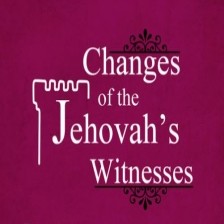In its articles on Jehovah, The Imperial Bible-Dictionary nicely illustrates the difference between ʼElo·him′ (God) and Jehovah. Of the name Jehovah, it says: “It is everywhere a proper name, denoting the personal God and him only; whereas Elohim partakes more of the character of a common noun, denoting usually, indeed, but not necessarily nor uniformly, the Supreme. . . . The Hebrew may say the Elohim, the true God, in opposition to all false gods; but he never says the Jehovah, for Jehovah is the name of the true God only. He says again and again my God . . . ; but never my Jehovah, for when he says my God, he means Jehovah. He speaks of the God of Israel, but never of the Jehovah of Israel, for there is no other Jehovah. He speaks of the living God, but never of the living Jehovah, for he cannot conceive of Jehovah as other than living.”—Edited by P. Fairbairn, London, 1874, Vol. I, p. 856
Insight On the Scriptures-Volume II. 1988. p. 8
Professor of Hebrew D. H. Weir therefore rightly says that those who claim Exodus 6:2, 3 marks the first time the name Jehovah was revealed, “have not studied [these verses] in the light of other scriptures; otherwise they would have perceived that by name must be meant here not the two syllables which make up the word Jehovah, but the idea which it expresses. When we read in Isaiah, ch. lii. 6, ‘Therefore my people shall know my name;’ or in Jeremiah, ch. xvi. 21, ‘They shall know that my name is Jehovah;’ or in the Psalms, Ps. ix. [10, 16], ‘They that know thy name shall put their trust in thee;’ we see at once that to know Jehovah’s name is something very different from knowing the four letters of which it is composed. It is to know by experience that Jehovah really is what his name declares him to be. (Compare also Is. xix. 20, 21; Eze. xx. 5, 9; xxxix. 6, 7; Ps. lxxxiii. [18]; lxxxix. [16]; 2 Ch. vi. 33.)”—The Imperial Bible-Dictionary, Vol. I, pp. 856, 857.
Insight On the Scriptures-Volume II. 1988. p. 12-13
Concerning this The Imperial Bible-Dictionary (edited by P. Fairbairn, London, 1874, Vol. I, p. 664) observes: “It is interesting to know that this [the goat] was the recognized symbol of their nation by the Macedonians themselves. Monuments are still extant in which this symbol occurs, as one of the pilasters of Persepolis, where a goat is depicted with one immense horn on his forehead, and a Persian holding the horn, by which is intended the subjection of Macedon by Persia” (something accomplished by the Persians toward the close of the sixth century B.C.E.).
Insight On the Scriptures-Volume I. 1988. p. 966
“The later Hebrews looked on the celebration of birthdays as a part of idolatrous worship, a view which would be abundantly confirmed by what they saw of the common observances associated with these days.”—The Imperial Bible-Dictionary (London, 1874), edited by Patrick Fairbairn, Vol. I, p. 225.
Reasoning From the Scriptures. 1985, 1989 ed. p. 69
The Greek word rendered “cross” in many modern Bible versions (“torture stake” in NW) is stau·ros′. In classical Greek, this word meant merely an upright stake, or pale. Later it also came to be used for an execution stake having a crosspiece. The Imperial Bible-Dictionary acknowledges this, saying: “The Greek word for cross, [stau·ros′], properly signified a stake, an upright pole, or piece of paling, on which anything might be hung, or which might be used in impaling [fencing in] a piece of ground. . . . Even amongst the Romans the crux (from which our cross is derived) appears to have been originally an upright pole.”—Edited by P. Fairbairn (London, 1874), Vol. I, p. 376.
Reasoning From the Scriptures. 1985, 1989 ed. p. 89
Of interest is a comment in The Imperial Bible-Dictionary of 1874: “[Jehovah] is everywhere a proper name, denoting the personal God and him only; whereas Elohim partakes more of the character of a common noun, denoting usually, indeed, but not necessarily nor uniformly, the Supreme. . . . The Hebrew may say the Elohim, the true God, in opposition to all false gods; but he never says the Jehovah, for Jehovah is the name of the true God only. He says again and again my God . . . ; but never my Jehovah, for when he says my God, he means Jehovah. He speaks of the God of Israel, but never of the Jehovah of Israel, for there is no other Jehovah. He speaks of the living God, but never of the living Jehovah, for he cannot conceive of Jehovah as other than living.”
Awake! February 8, 1999 p. 8
